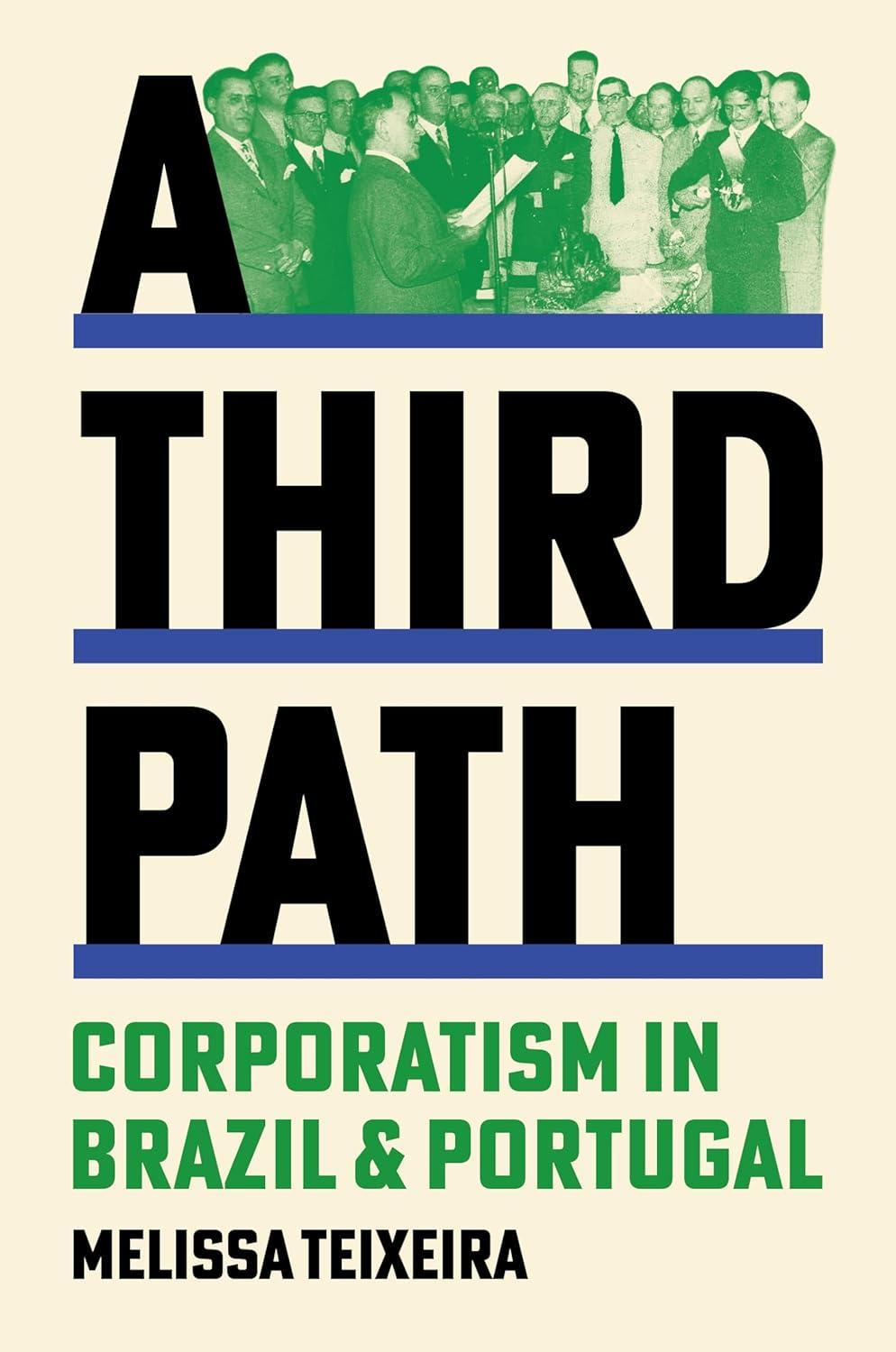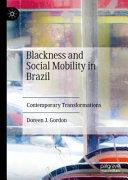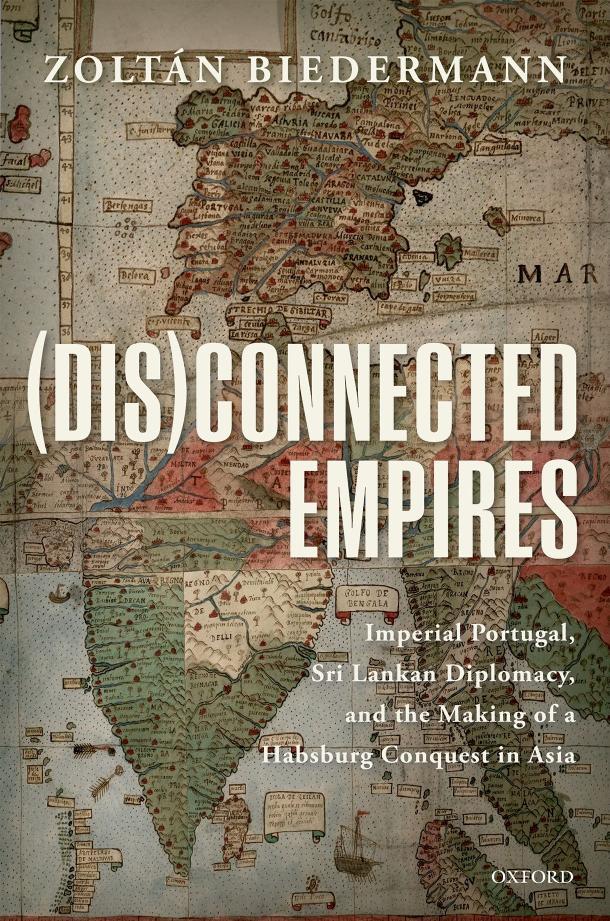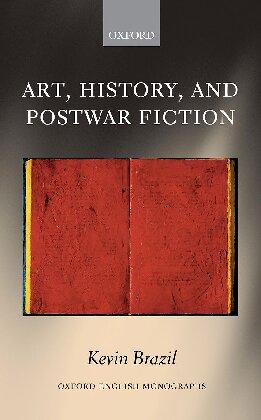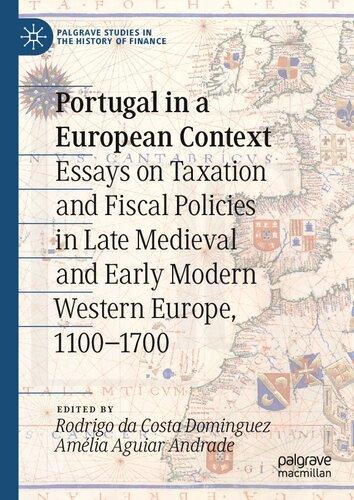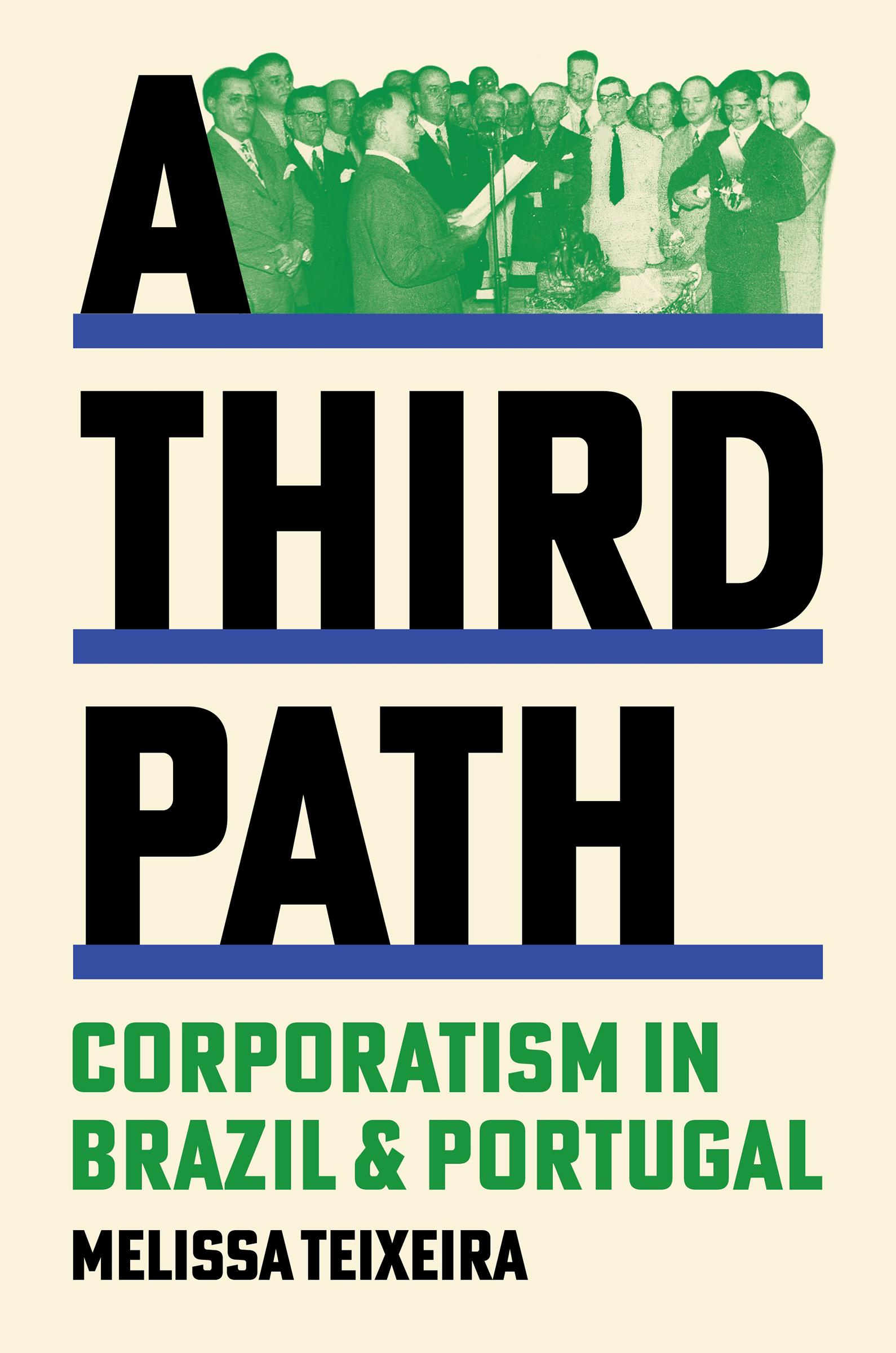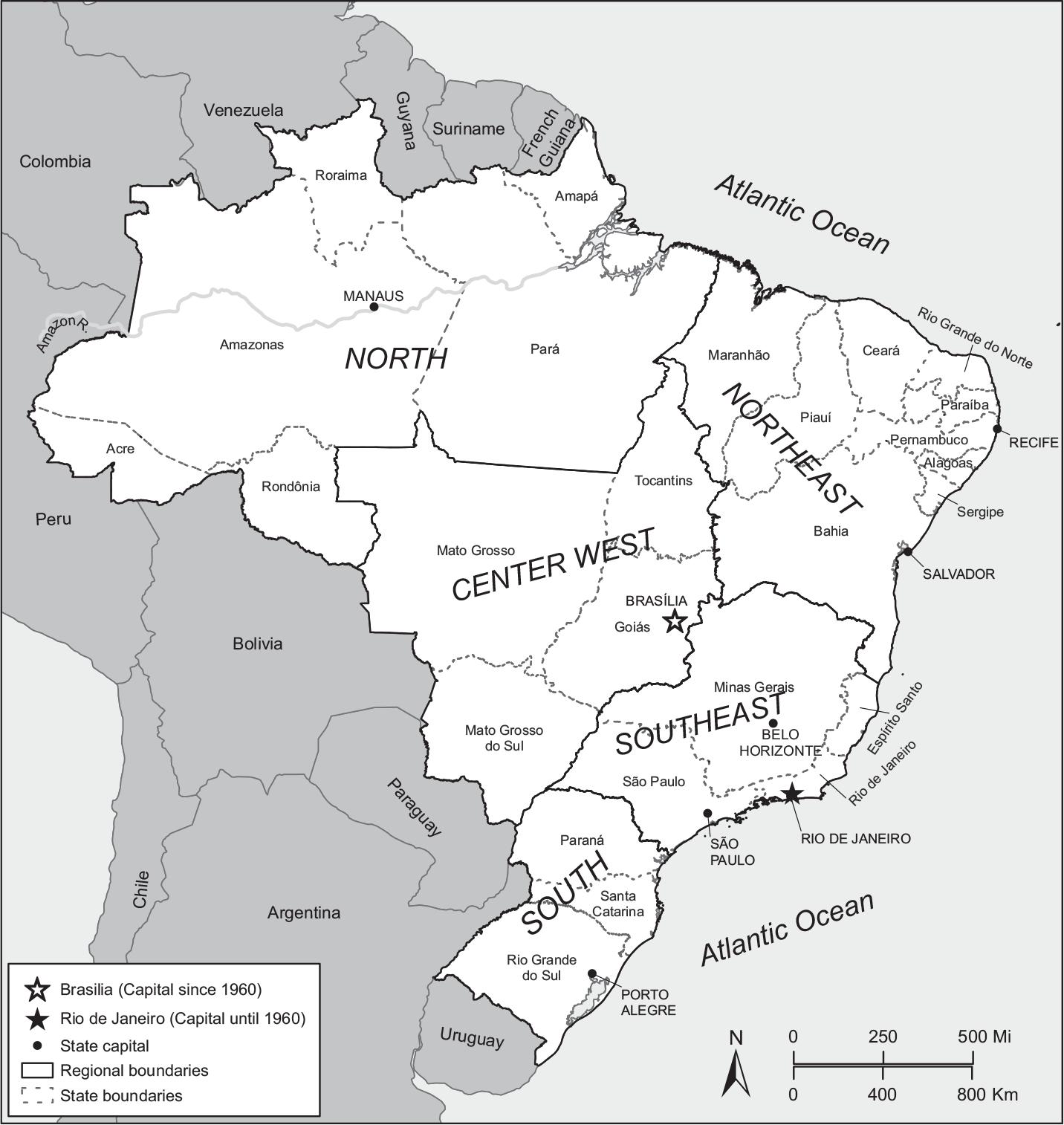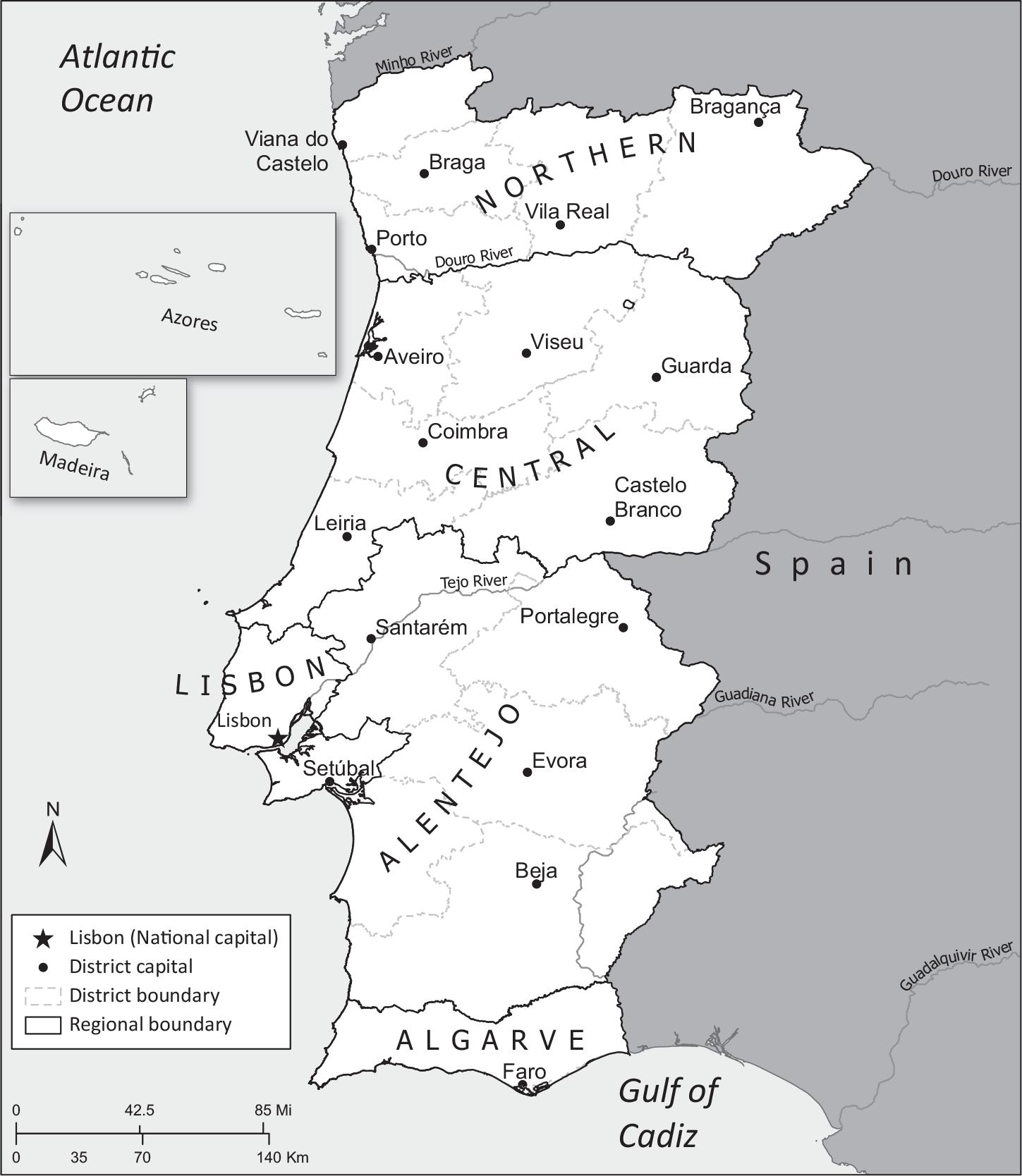A Third Path: Corporatism in Brazil and Portugal Melissa Teixeira
Visit to download the full and correct content document: https://ebookmass.com/product/a-third-path-corporatism-in-brazil-and-portugal-meliss a-teixeira/
More products digital (pdf, epub, mobi) instant download maybe you interests ...
Chosen Path (A Bodhi King Novel Book 7) Melissa F.
Miller
https://ebookmass.com/product/chosen-path-a-bodhi-king-novelbook-7-melissa-f-miller/
A Weekend in Paris Melissa Hill
https://ebookmass.com/product/a-weekend-in-paris-melissa-hill/
Blackness and Social Mobility in Brazil Doreen Joy
Gordon https://ebookmass.com/product/blackness-and-social-mobility-inbrazil-doreen-joy-gordon/
Opera in the Tropics: Music and Theater in Early Modern Brazil Rogerio Budasz
https://ebookmass.com/product/opera-in-the-tropics-music-andtheater-in-early-modern-brazil-rogerio-budasz/
(Dis)Connected Empires: Imperial Portugal, Sri Lankan Diplomacy, and the Making of a Habsburg Conquest in Asia
Zoltán Biedermann
https://ebookmass.com/product/disconnected-empires-imperialportugal-sri-lankan-diplomacy-and-the-making-of-a-habsburgconquest-in-asia-zoltan-biedermann/
A Diamond From Tiffany's Melissa Hill
https://ebookmass.com/product/a-diamond-from-tiffanys-melissahill/
Art, History, and Postwar Fiction Kevin Brazil
https://ebookmass.com/product/art-history-and-postwar-fictionkevin-brazil/
Becoming Jewish, Believing in Jesus: Judaizing Evangelicals in Brazil Manoela Carpenedo
https://ebookmass.com/product/becoming-jewish-believing-in-jesusjudaizing-evangelicals-in-brazil-manoela-carpenedo/
Portugal in a European context: essays on taxation and fiscal policies in late medieval and early modern Western Europe, 1100-1700 Rodrigo Da Costa Dominguez
https://ebookmass.com/product/portugal-in-a-european-contextessays-on-taxation-and-fiscal-policies-in-late-medieval-andearly-modern-western-europe-1100-1700-rodrigo-da-costa-dominguez/
A THIRD PATH
HISTORIES OF ECONOMIC LIFE
JeremyAdelman,SunilAmrith,EmmaRothschild,and
FrancescaTrivellato,SeriesEditors
AThirdPath: Corporatism in BrazilandPortugalby Melissa Teixeira
Power andPossession in the Russian Revolution by Anne O’Donnell
Towarda Free Economy: Swatantra andOpposition Politics in Democratic India by Aditya Balasubramanian
No Return: Jews, Christian Usurers, andthe SpreadofMass Expulsion in MedievalEurope by Rowan Dorin
Desert Edens: ColonialClimate Engineering in the Age ofAnxiety by Philipp Lehmann
Distant Shores: ColonialEncounters on China’s Maritime Frontier by Melissa Macauley
AVelvet Empire: FrenchInformalImperialism in the NineteenthCentury by David Todd
Making ItCount: Statistics andStatecraft in the Early People’s Republic ofChina by Arunabh Ghosh
Empires ofVice: The Rise ofOpium Prohibition across Southeast Asia by Diana S. Kim
Pirates andPublishers: ASocialHistory ofCopyright in Modern China by Fei-Hsien Wang
Sorting Outthe MixedEconomy: The Rise andFallofWelfare and DevelopmentalStates in the Americas by Amy C. Offner
RedMeat Republic: AHoof-to-Table History ofHow BeefChanged America by Joshua Specht
The Promise andPerilofCredit: Whata Forgotten LegendaboutJews andFinance Tells Us aboutthe Making ofEuropean Commercial Society by Francesca Trivellato
APeople’s Constitution: The Everyday Life ofLaw in the Indian Republic by Rohit De
ALocalHistory ofGlobalCapital: Jute andPeasant Life in the Bengal Delta by Tariq Omar Ali
A Third Path
CORPORATISM IN BRAZIL AND PORTUGAL MELISSA TEIXEIRA
PRINCETON UNIVERSITY PRESS
PRINCETON & OXFORD
Copyright © 2024 by Princeton University Press
Princeton University Press is committed to the protection of copyright and the intellectual property our authors entrust to us. Copyright promotes the progress and integrity of knowledge. Thank you for supporting free speech and the global exchange of ideas by purchasing an authorized edition of this book. If you wish to reproduce or distribute any part of it in any form, please obtain permission.
Requests for permission to reproduce material from this work should be sent to permissions@press.princeton.edu
Published by Princeton University Press
41 William Street, Princeton, New Jersey 08540
99 Banbury Road, Oxford OX2 6JX press.princeton.edu
All Rights Reserved
Library of Congress Cataloging-in-Publication Data
Names: Teixeira, Melissa, 1986– author
Title: A third path: corporatism in Brazil and Portugal / Melissa Teixeira.
Description: Princeton: Princeton University Press, 2024 | Series: Histories of economic life | Includes bibliographical references and index.
Identifiers: LCCN 2023023931 (print) | LCCN 2023023932 (ebook) | ISBN 9780691191027 (hardback) | ISBN 9780691258157 (ebook)
Subjects: BISAC: HISTORY / Latin America / South America | POLITICAL SCIENCE / Political Ideologies / Capitalism
Classification: LCC HC187.T428 2024 (print) | LCC HC187 (ebook) | DDC 330.98—dc23/eng/20230823
LC record available at https://lccn.loc.gov/2023023931
LC ebook record available at https://lccn.loc.gov/2023023932
Version 1.0
British Library Cataloging-in-Publication Data is available
Editorial: Priya Nelson, Morgan Spehar, and Emma Wagh
Production Editorial: Theresa Liu
Jacket/Cover Design: Katie Osborne
Production: Lauren Reese
Publicity: William Pagdatoon
Copyeditor: Cindy Milstein
Jacket image: Center for Research and Documentation of the Contemporary History of Brazil, Fundação Getúlio Vargas, Rio de Janeiro
CONTENTS
Acknowledgments vii
ListofAbbreviations xiii
Introduction 1
PART I
1 Crisis 25
2 Experiments in Corporatist Constitutions 59
PART II
3 Corporatist Economics and the Third Path 97
4 Just Price and Production 130
5 Popular and Political Economy 164
PART III
6 Wartime Economics 191
7 Corporatism to Planning 226
Conclusion 257
Notes 265 Bibliography 321
Index 357
ACKNOWLEDGMENTS
THE WRITING OF THIS BOOK—much like the project itself—has unfolded across many cities and countries. I begin with a few words of gratitude for the individuals and institutions that have supported me along the way.
First, thanks go to three mentors who have each been a constant source of encouragement and model of how to be a scholar-teacher. Jeremy Adelman has been beyond generous in seeing the full potential of this project. He has time and again guided me in thinking globally and boldly about the ideas discussed in this book, while always encouraging me to stay true to my instincts and priorities as a historian. He has also been my champion in all areas of my professional growth, with his optimism assuring me along the way that I was on the right track, even when I was not so sure myself. Emma Rothschild is the reason I became a historian, thanks to her unfailing support of me as a scholar, teacher, and person over the past fifteen years. She is the sharpest reader of my work and model for how to continuously expand the nature of economic history. Barbara Weinstein has given me a singular model for how to combine intellectual rigor with warmth and compassion. She has always been generous with her time and feedback, and discussing Brazil—past and present with her has directly informed so many of my own research commitments.
At the University of Pennsylvania, I am grateful to work alongside a supportive group of scholars and teachers. Department of History chairs Antonio Feros, Sophia Rosenfeld, and Beth Wenger have consistently gone above and beyond with their support of junior faculty. My colleagues have been my closest interlocuters as I
finished this book, and also provided many welcome diversions with happy hour drinks and by watching soccer games. I particularly thank Oscar Aguirre-Mandujano, Eiichiro Azuma, Cheikh Babou, Mia Bay, Anne Berg, Warren Breckman, Kathleen Brown, Lee Cassanelli, Brent Cebul, Roger Chartier, Frederick Dickinson, Jared Farmer, Siyen Fei, Roquinaldo Ferreira, Marc Flandreau, Sarah Barringer Gordon, Sarah Gronningsater, Emma Hart, Peter Holquist, Firoozeh KashaniSabet, Ada Kuskowski, Walter Licht, Ann Moyer, Benjamin Nathans, Marcy Norton, Kathy Peiss, Eve Troutt Powell, Ramya Sreenivasan, Karen Tani, Josh Teplitsky, and Secil Yilmaz. I am especially grateful to Ann Farnsworth-Alvear for her continued mentorship—and offering to read and comment on the manuscript, providing vital feedback at key stages of the writing process. Amy Offner read and offered feedback on the entire manuscript too, and I remain beyond grateful for her moral and practical advice. In the history department, Octavia Carr, Yvonne Fabella, Angela Faranda, Joan Plonski, and Chris Sabella make the research and teaching we do possible.
At Penn, I have also benefited from conversations with colleagues in other departments and fields. Annette Lareau and Emily Steiner have been exceptional mentors to junior scholars like myself. A special thanks to the Wolf Humanities Center and 2020–21 fellows who provided much-needed intellectual connection (over Zoom) during the pandemic. I am especially fortunate to be a member of the Center for Latin American and Latinx Studies. Thank you to Catherine Bartch and Tulia Falleti for inviting me to be part of so many wonderful events as well as their support of my teaching and research. Thanks, too, to Michael Hanchard and Zita Nunes for the continued research collaborations and their friendship. At Penn Libraries, I am indebted to all the librarians who have tracked down books for me, especially to Joseph Holub and Nicholas Okrent.
The Joint Center for History and Economics at Cambridge University and Harvard University has been my second intellectual home. From my studies at the University of Cambridge to the Prize
Fellowship in Economics, History, and Politics at Harvard University, the center has been the space where I have workshopped chapters, organized conferences, and made deeply supportive friendships. Emily Gauthier, Inga Huld Markan, and Jennifer Nickerson make all of these collaborations and events possible. Thanks to the wider center network for reading and engaging with my work over the years, including Sunil Amrith, Aditya Balasubramanian, Abhijit Banerjee, Elsa Génard, Namrata Kala, Diana Kim, Ian Kumekawa, Jonathan Levy, Jacob Moscona, Kalyani Ramnath, Pedro Ramos Pinto, Pernille Røge, Amartya Sen, David Todd, Francesca Trivellato, Richard Tuck, and Lola Zappi. I am especially grateful for the writing group formed with prize fellows Shane Bobrycki, Paige Glotzer, and Anne Ruderman; thank you for workshopping several chapters in this book.
I began research for this project as a graduate student at Princeton University and remain indebted to its faculty, staff, and vibrant graduate community. Daniel Rodgers agreed, from early on, to invest in a project both thematically and geographically quite removed from his own area of research. For this, I remain immensely grateful. For their comments, questions, reading suggestions, and encouragement, I am grateful to have studied and worked with Vera Candiani, Mariana Candido, Bruno Carvalho, Hendrik Hartog, Harold James, Steven Kotkin, Pedro Meira Monteiro, and Philip Nord. Rob Karl has been a mentor and friend throughout this process. His commitment to teaching and his students is an inspiration, and he has provided essential feedback on both the dissertation and book, not least with help in designing the two maps featured. My graduate school experience was marked by camaraderie and intellectual exchange thanks to Diana Andrade, Teresa Davis, Rohit De, Catherine Evans, Margarita Fajardo, Cristina Florea, Christopher Florio, Sergio Galaz García, Evan Hepler-Smith, Molly Lester, Jessica Mack, Martin Marimón, Iwa Narwocki, Padraic Scanlan, Marcia Schenck, Humberto Schwarzbeck Aguirre, Fidel Tavarez, Paula Vedoveli, and Alden Young. From Princeton to
Philadelphia, Alex Chase-Levenson and Meg Leja have been true and trusted friends, offering words of encouragement and pragmatic advice. Special thanks is owed to Valeria López Fadul for her unwavering friendship and generous readings of many chapters in this book. And from Princeton to Rio de Janeiro, Lisbon, and Cambridge, Carolina Sá Carvalho and Nathaniel Wolfson have become family.
I am particularly grateful to belong to a community of Brazil and Latin America scholars who have commented on conference papers, read chapters, and discussed the book’s ideas and methods with me. Special thanks to Celso Castilho, Sidney Chalhoub, Amy Chazkel, Marshall Eakin, Federico Finchelstein, Brodwyn Fischer, John French, Casey Lurtz, Gillian McGillivray, Elena Schneider, and Christy Thornton. Researching this book in archives in Brazil and Portugal, moreover, was a far more rewarding process (and far less lonely than one might expect) thanks to Genevieve Dempsey, Rosanna Dent, Aiala Levy, Alexander Ponsen, Gabriel Rocha, and Marcio Siwi.
The transnational scope of this project would not be possible without generous support from several research institutions. At Penn, both the university and School of Arts and Sciences has offered generous research support and sabbatical leave that made it possible for me to complete this book. I am especially thankful to the Fulbright Commission, which sponsored a yearlong research trip to Brazil in 2014. The History Project (supported by the Joint Center for History and Economics and Institute for New Economic Thinking), Fundação Calouste Gulbenkian, and Fundação Luso-Americana made possible several research trips to Portugal. At Princeton, the Department of History alongside Princeton Latin American Studies and Princeton International and Regional Studies made possible research trips to Portugal and Brazil at the earliest stages of this project. Additional grants like the Whiting Fellowship in the Humanities and Bassi Scholarship have supported me at different stages. Finally, my path to becoming a historian began with the Thouron Award, which made it possible for me to study at the
University of Cambridge from 2008 to 2009. A special thanks is owed to the Thouron family—Jan, Rachel, and Rupert—and everexpanding network of Thouron alums for their continued support.
In Brazil and Portugal, I benefited from the generosity of many colleagues and friends who invited me to partake in the academic life of their universities as well as helped me find my way in local archives and historiographical debates. In Lisbon, I remain especially grateful to António Costa Pinto, who supported me as a visiting scholar at the Instituto de Ciências Sociais, and invited me to be part of his ever-expanding and multinational network of scholars working on corporatism. Thank you for the invitations to workshops, many books sent my way, and invaluable feedback offered on the manuscript. In Lisbon and Coimbra, Pedro Cardim, José Luís Cardoso, Rita Almeida de Carvalho, Dulce Freire, and Álvaro Garrido also provided invaluable suggestions on necessary readings and how to navigate archives. In Brazil, Lilia Moritz Schwarcz supported this project in its earliest stages and has been so generous with her suggestions. André Botelho has been a trusted friend and interlocutor since the beginning of this project. I am especially grateful for his invitations to seminars and the many conversations we have shared in seminars and over beers about some of the central intellectuals featured in this book and the lasting importance of these figures for thinking about Brazilian politics today. Lastly, an enormous debt of gratitude is owed to Luciano Aronne de Abreu, Bruno Biasetto, Nathalia Henrich, Ângela de Castro Gomes, Francisco Palomanes Martinho, Marco Aurélio Vannucchi Leme de Mattos, and Luís Rosenfeld for inviting me to be part of their network of researchers working on corporatism. At workshops, on conference panels, and in informal conversations, I first tested the ideas and arguments presented in this book with them, and the book is stronger thanks to their questions, comments, and critiques. This book would not be possible without the help of countless librarians and archivists in Rio de Janeiro, Niterói, Brasília, São Paulo, Lisbon, and Coimbra who went above and beyond to help me gain
access to documents and books. In particular, Odette Martins at the Arquivo Nacional do Torre do Tombo in Lisbon, Portugal made it possible for me to view documentation not yet cataloged or opened to the public. Similarly, the staff of the Casa Oliveira Vianna in Niterói, Brazil, allowed me to research at this site despite closures, and were so generous and flexible with their schedules.
I am especially grateful to the editors of the History of Economic Life Series at Princeton University Press for their continued support of this project. Editor Priya Nelson has been so encouraging and helpful in shaping the book, and I am thankful to have the support of Emma Wagh and Theresa Liu during the final stages of production. Beyond PUP, thanks also to development editor Pamela Haag, who helped refine my voice and give the book a clearer structure.
I am grateful to my friends and family for forgiving my long absences during research trips, offering words of encouragement, and drawing me away from writing for much-needed diversions. To friends in Rio de Janeiro—especially Clarice—who invited me to stay in their homes during research trips, and made sure that I made room for beer and samba, thank you. Daniella was my first roommate in Rio de Janeiro, and is still one of my truest and oldest friends. To so many longtime and recent friends, in and beyond Philadelphia—especially Anna, Ashley, Caroline, Elisa, Natalie, Natasha, Rebecca, and Vicky—thank you for asking about the book and also talking about anything but the book. My family Tia Esmeralda and my late Tio João; Tio Artur and Tia São; and my cousins Andie, John, Logan, Melanie, Sidney, Steven, and Suzy—is my biggest source of constancy and encouragement. In Lisbon, Maria Alice and Tony have always given me a home away from home during research trips, alongside Luca, Luna, Quelia, and Ricardo.
Last and foremost, this book is dedicated to my parents, Carlos and Maria. This book would not be possible without them. They have consistently prioritized my education, even though they never had access to even a fraction of the educational opportunities that I have
been afforded. They also never allowed their US-born daughter to forget how to speak Portuguese and took me often to Portugal so that I could develop my own ties to the country. Whether they knew it at the time, these experiences inspired a curiosity in me about the history of the Portuguese-speaking world that has sustained this project. Above all, I thank them for their unconditional love and support.
DOPS
IBGE
NST
ABBREVIATIONS
Ação Integralista Brasileira (Brazilian Integralist Action)
Comisión Económica para América Latina y el Caribe (Economic Commission for Latin America and the Caribbean)
Conselho Federal de Comércio Exterior (Federal Council of Foreign Trade)
Coordenação da Mobilização Econômica (Coordination for Economic Mobilization)
Departamento de Ordem Política e Social (Department of Political and Social Order)
Instituto Brasileiro de Geografia e Estatística (Brazilian Institute of Geography and Statistics)
Tribunal de Segurança Nacional (National Security Tribunal)
MAP 1. Brazil. Created by Girmaye Misgna, mapping and geospatial data librarian, University of Pennsylvania Library.
MAP 2. Portugal. Created by Girmaye Misgna, mapping and geospatial data librarian, University of Pennsylvania Library.
A THIRD PATH
Introduction
IN AUGUST 1941, Marcello Caetano (1906–80), Portuguese law professor and future dictator, arrived in Rio de Janeiro for a conference to commemorate recent constitutional innovations in Brazil and Portugal. In the 1930s, both nations eschewed liberal and laissez-faire conventions to adopt constitutions that overturned protections for individual liberties and formally installed a corporatist system that emboldened state powers to regulate labor relations and market competition. It was an unusual moment to celebrate constitutional matters: World War II was a struggle between democracy and authoritarianism, and it had become increasing difficult for the dictators in power in Brazil and Portugal to fend off growing opposition that their constitutions were anything but a farce. And yet the intellectuals, jurists, and government officials gathered at this conference redoubled their efforts to celebrate their corporatist path as a “third path”—one neither liberal nor socialist, neither laissez-faire nor state controlled—guiding their societies to political stability, social peace, and economic progress. To them, corporatism remained key to solving pressing challenges, those lingering from the Great Depression and mounting with each country’s drive for economic development. Corporatism was not only better suited to these societies than liberalism, so they constructed their argument, but also had nothing to do with Fascist Italy a necessary disclaimer during the war. “Corporatism is a timeworn principle, one that maintains its relevance,” Brazil’s CorreiodaManhã concluded from reporting on Caetano’s visit.1
A Third Path explores Brazilian and Portuguese efforts to overcome the Great Depression by reinventing, as they saw it, a
medieval guild system in order to explain why corporatism proved so enduring in Europe and Latin America. In the 1920s and 1930s, countries as diverse as France, Italy, Spain, Portugal, Austria, Romania, Brazil, Mexico, and Argentina, among others, experimented with corporatist modes of organizing political representation, labor relations, and economic production. Corporatism offered new possibilities for how to harness the powers of expanding government bureaucracies to improve societal welfare, increase domestic food production, and industrialize quickly, and many proponents of this third path advocated for programs similar to those adopted by countries experimenting with other models of the mixed economy. Corporatism is thus key to understanding the rise of new forms of the state’s management of economic life in the interwar decades, and yet it has also remained a somewhat vague concept, partly because, as political scientist Philippe Schmitter notes in his iconic essay “Still the Century of Corpo-ratism?,” it “can be found everywhere and, hence, is nowhere very distinctive.”2 What made corporatism unique, however, was how this technocratic project got grafted onto older utopian visions of society comprised not of atomized individuals but instead vertically organized social and economic interests. To study corporatism is then to consider some of the forgotten ideological and institutional origins of the midcentury regulatory state.
I explain the emergence and persistence of modern corporatism by looking at its parallel, and connected, rise in Brazil under dictatorturned-populist president Getúlio Vargas (1882–1954) and Portugal under the dictatorship of António de Oliveira Salazar (1889–1970), where each regime took the name of Estado Novo (New State). Vargas took power following the 1930 Revolution that toppled Brazil’s First Republic (1889–1930), in which political power rested with regional oligarchs tied to commodity-export sectors. He governed Brazil from 1930 until his ouster from power in 1945—a period largely defined by the authoritarian corporatist Estado Novo regime installed through his self-coup in 1937. A political chameleon,
Vargas managed to return to power in 1951 by popular electoral mandate, shedding his associations with interwar dictatorships, and embracing a populist and developmentalist platform.3 Salazar was a university professor who started his improbable political rise as finance minister in 1928, imposing a severe austerity program to address Portugal’s financial crisis. Appointed prime minister from power in 1932, Salazar governed Portugal until 1968. He implemented his own corporatist, authoritarian Estado Novo that survived until 1974 under his successor, Caetano. As committed as Brazilian and Portuguese officials were to their united efforts to reinvent past traditions in order to displace political and economic liberalism, their corporatist experiments to address long-run problems—especially underdevelopment were hardly straightforward translations of doctrine into practice. On both sides of the South Atlantic, jurists, intellectuals, and political officials debated the meaning of corporatism for the modern world as they stretched the illiberal logic underpinning their ambitions to new programs and policies in order to fix economic problems. The Vargas and Salazar dictatorships show the durability of corporatism, and the historical as well as continued relevance of this conservative, hierarchical, and statist worldview.
Defining Corporatism
Corporatism itself is not easy or obvious to define, and indeed its mutable definitions and different uses are a key theme throughout this book. This ism had no founder, canonical text, or country of origin. It was an inherently transnational phenomenon, with multiple intellectual genealogies that, at times, appeared at odds.4 The jurists, intellectuals, bureaucrats, industrialists, landowners, and workers who supported corporatism held a variety of opinions and ideological leanings. They also themselves struggled with definitions, frequently united more by their opposition to other ideologies than by their own policies.
In broadest and simplest terms, corporatism is a system that sets out to organize society according to economic and social interests, and vertically integrate these groups into the state so that it can intervene in labor relations and economic production. While committed to private property and individual initiative, corporatists wanted these impulses subordinated to the greater needs and interests of the nation. Corporatism mirrored other mixed economy experiments in the 1930s in which the state regulated economic activities. Distinctively, however, it disavowed individual freedoms and emphasized the preservation of existing social hierarchies. Corporatists instead stressed the importance of social rights and representation through sectoral interest groups that were supported and protected according to national imperatives.
Beyond this simple definition, corporatism contains multitudes and paradoxes. Corporatists were nationalists who supported increased state powers over national life, but did not envision a state that directly controlled the mode of production. Corporatism was a strategy for political legitimacy and survival too. Sometimes, corporatism is lumped with fascism or allied with nebulous intellectual tendencies on the Right.5 Still others see corporatism as a general orientation, neither Left nor Right, but conservative and Catholic, or they treat it as a narrow and well-defined set of institutions to organize industrial relations.6 Sometimes it is defined with a school of economic thought that promoted state-led coordination of the economy with special attention to the collective rights of labor and capital, and sometimes it is a political system in which both democratic participation and governments are organized around profession and class. Others see corporatism as a corrupted system of regulations and controls that has benefited certain industries and groups above others, viewing it as synonymous with categories like state capitalism, crony capitalism, or regulatory capture.7
Despite or because of corporatism’s categorical ambiguity, this book contends that its proponents attempted to assert the originality
of their experiment by mounting powerful critiques of the failures of democratic political institutions, laissez-faire capitalism, and liberal internationalism in the 1920s and 1930s. Its history is as essential to understanding the breakdown of liberal governance as it is to explaining the lure of dictatorships in these crucial decades. Historian Eric Hobsbawm famously suggests in TheAgeofExtremes that the history of the twentieth century was not as simple as a contest between the two “binary opposites” of capitalism and socialism.8 For Brazil and Portugal, this book shows the complexity that lay between or, better, outside two extremes.
This struggle for a third path was global. Corporatism was transnational in its application as well as its theoretical evolution. Comparison and translation were at its core.9 As a point of departure, this book builds on the richly established field of transnational history to consider how debates within and across national contexts shaped the meaning and practice of corporatism.10 It features a loose network of jurists, intellectuals, economists, and public officials between Brazil and Portugal, while also recognizing the asymmetrical nature of this exchange as well as how these networks stretched into other contexts such as Fascist Italy or the New Deal United States. Brazil and Portugal are often cast as passive recipients of ideas and models from the industrial North Atlantic. By turning the gaze southward and utilizing this multicentered and transnational approach in the South Atlantic, this book positions a region not often studied for its legal or economic creativity as a major hub of policy experimentation.11
In combining methodologies of transnational history, intellectual history, and political economy, this book is ultimately a history of economic life that captures the rise of state-led development in Brazil and other contexts. It demonstrates how the economies of the South Atlantic embarked on a global project to carve out an alternative to liberal or laissez-faire capitalism. With a few notable exceptions, corporatism has been left out of recent histories of capitalism in the twentieth century because scholars characterize it
as a deviation from so-called proper stages of development, conflate it with fascism, or dismiss it as the window dressing of nationalist dictatorships. While corporatism has been a vibrant area of research among historians in Brazil and Portugal, it is less familiar for Englishlanguage audiences.12 This book expands that scholarship by asking new questions: How did corporatist experiments inform new ideas of economic development and social peace? How did these ideas shape how national governments intervened in economic life in the 1930s and 1940s? How did corporatism survive into the postwar period to shape the rise of bolder state-led projects for modernization, industrialization, and development?
These questions are especially salient because increased state intervention in labor relations, economic production, and commerce is not exclusive to corporatist regimes. Over the past few years, historians have explored the ways that states tinkered with the economy during the interwar decades to understand how the state emerged as a primary actor for economic development in the twentieth century.13 Sociologist Johanna Bockman and others have questioned or upended older dichotomies between “capitalist” and “command” in twentieth-century histories of development, either by exploring the connections or parallels between capitalist and socialist contexts, or debunking prior assumptions of ideological purity.14 Corporatism is missing in this conversation about the emergence of new economic regimes in the twentieth century. Corporatist experiments were neither ephemeral nor reducible to the dictators who first introduced them, and persisted through democratic and authoritarian governments.
Corporatism is so difficult to pin down in part because it is not exclusively a law, institution, or government but rather a framework, logic, and worldview concerning state-society relations with longlasting legacies. Brazil and Portugal stitched corporatist ideas into their legal and constitutional fabric, which is one of the features that distinguished their corporatist experiments from other forms of the mixed economy. Corporatism codified the notion that rights should
be unequally distributed according to economic function and the greater national interest, thereby transforming a de facto feature of most liberal regimes from an institutional failure into a necessary ingredient for social peace and economic development. Consequently, I argue that corporatism was not an interwar exception to liberal governance; its institutions and logic survived World War II to shape how the state intervenes in labor and market relations to the present day.
A History of Corporatism
When Vargas and Salazar used corporatism, they were not inventing a new concept but instead refashioning an ancient one to modern uses. Corporatism derives from the Latin word corpus, or body, and when applied to society suggests a singular organism in which each part has a designated role, in contrast to a collection of atomized individuals. This ideal of society as more than the sum of its parts is one unifying thread among the many corporatisms that evolved over centuries. Corporatist antecedents existed in Roman law, for example, with the corporation a “legal fiction” representing a collective of people in a lasting entity that would survive any individual person, but the concept is generally associated with the Middle Ages.15 By the fourteenth century, Roman conceptions of the corporation were applied to self-governing city-states and guilds in Europe, granting legal personality to these governing units. Corporate personhood was defined hierarchically as well as by economic and social function, whether granted to guilds, the church, or the military. Laws issued by these legal entities regulated local economic conditions. Merchants and artisans formed guilds to control entry into their industry, and regulate the price and quality of goods. The Spanish and Portuguese Empires extended this system to their overseas colonies, assigning rights and privileges to corporate institutions, and in effect legalizing social and racial hierarchies. In Brazil and the Spanish Americas, distant monarchs sent bureaucrats and magistrates to preside over diverse colonial populations and
dispense justice in ways that afforded distinct legal protections to each corporate group, but always in accordance with the goals of the Crown.16 This system of variegated justice epitomized, for instance, with the fueros in the Spanish Empire in which different classes, communities, or regions were governed according to distinct legal codes was predicated on a logic of inclusivity but not equality.17 Centuries later, modern corporatist dictatorships would take inspiration from earlier monarchical and imperial models.18
The French Revolution, independence wars in the Americas, and liberal revolts during the nineteenth and early twentieth centuries shattered this system of controls and privileges, giving rise to constitutional monarchies and republican governments. Both Brazil and Portugal established constitutional monarchies following Brazil’s independence in 1822. Those advocating for liberal reforms wanted protections for individual rights and property, a separation of church and state, the dissolution of trade monopolies, and free trade as engines of growth and progress.19 But liberalism and its emphasis on individual freedoms was not endorsed by all social groups, and not only because of the persistence of slavery in Brazil and the Portuguese Empire.20
Historians call the “long” nineteenth century the century of liberalism, but corporatism as an ideal and economic system never really disappeared. Nineteenth-century French political economist Henri de Saint-Simon, for example, urged technocratic and coordinated political solutions to address the hardships that the working classes endured with industrialization, calling on industrialists to head the effort.21 His critiques of liberalism and individualism informed positivist thinkers like French philosopher Auguste Comte, who became especially influential to Brazilian military generals and engineers in the late nineteenth century.
After the abolition of slavery in Brazil in 1888, military generals overthrew the monarchy to drive greater modernization. Positivism and corporatism have distinct genealogies, but these ideologies overlapped in that they both described society as a living organism
comprised of the sum of its specialized parts—the family, military, and different productive classes. Brazilian historians debate the finer points of positivist influence on the First Republic, but generally agree that it offered a model for “progressive conservatism” or “modernizing conservatism.”22 Scholars trace the origins of modern authoritarianism to positivists like Alberto Torres, who influenced a later generation of corporatists.23 Insisting on Brazil’s lack of preparedness for elections and representative government, positivists promoted technocracy and rule by experts, guided by military personnel and engineers. Positivists also shaped republican projects to address Brazil’s stagnation, especially in public health and infrastructure, but always with the goal of progress with order.24
The persistence of corporatism can partly be explained as a conservative reaction to the rise of anarchist, socialist, and syndicalist movements. For conservative intellectuals in particular, corporatism aligned closely with anticommunism and rising Catholic social thought, with its emphasis on duties over rights and social peace over class conflict. This is as much the case in Brazil as in Portugal. In 1891, Pope Leo XIII’s Rerum Novarum, subtitled Rights and Duties of Capital and Labor, called on governments and employer classes to respect the dignity of workers and concede collective bargaining solutions to improve their conditions. The encyclical lamented the diminished role of corporate bodies during the nineteenth century, and called for workers and employers alike to organize themselves into associations along vocational lines. In Catholic societies, these intermediary institutions—between the individual and the state—would be responsible for the moral and material well-being of their members.25 Rerum Novarum denounced the inherent greed of capitalism that impoverished the working classes while magnifying the lure of anarchism, socialism, and other anti-Catholic movements.26
The interwar resurgence of corporatism was further stoked by alarm over the Bolshevik threat. Historians have largely explained the rise of corporatist dictatorships as responses to fears that social
